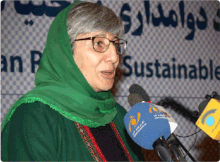|
Sima Samar
 
Sima Samar (Persian: سیما سمر; born 3 February 1957) is a Hazara human rights advocate, activist and medical doctor within national and international forums, who served as Minister of Women's Affairs of Afghanistan from December 2001 to 2003. She is the former Chairperson of the Afghan Independent Human Rights Commission (AIHRC) and, from 2005 to 2009, United Nations Special Rapporteur on the situation of human rights in Sudan.[1] In 2012, she was awarded the Right Livelihood Award for "her longstanding and courageous dedication to human rights, especially the rights of women, in one of the most complex and dangerous regions in the world." Early life and educationSamar was born on 3 February 1957 in Jaghori, in the Ghazni Province of Afghanistan. She belongs to the ethnic Hazara. She obtained a degree in medicine in February 1982 at Kabul University. She practiced medicine at a government hospital in Kabul, but after a few months was forced to flee for her safety to her native Jaghori, where she provided medical treatment to patients throughout the remote areas of central Afghanistan. She has also remained the head of the human rights commission in Afghanistan. CareerIn 1984, the government of the Democratic Republic of Afghanistan arrested her husband, and Samar and her young son fled to neighboring Pakistan. She then worked as a doctor at the refugee branch of the Mission Hospital. Distressed by the total lack of healthcare facilities for Afghan refugee women, she established in 1989 the Shuhada Organization and Shuhada Clinic in Quetta, Pakistan. The Shuhada Organization was dedicated to the provision of healthcare to Afghan women and girls, training of medical staff and education. In the following years, further branches of the clinic/hospital were opened throughout Afghanistan. Political careerAfter living as a refugee for over a decade, Samar returned to Afghanistan in 2002 to assume a cabinet post in the Afghan Transitional Administration led by Hamid Karzai. In the interim government, she served as Deputy President and then as Minister for Women's Affairs. She was the 6th woman to become Cabinet Minister in Afghanistan,[2] the first Minister for Women's Affairs since Shafiqa Ziaie in the 1970s, and the first woman to become minister since 1992.[3] She was forced into resignation from her post after she was threatened with death and harassed for questioning conservative Islamic laws, especially sharia law, during an interview in Canada with a Persian-language newspaper. During the 2003 Loya Jirga, several religious conservatives took out an advertisement in a local newspaper calling Samar the Salman Rushdie of Afghanistan. Samar headed the Afghanistan Independent Human Rights Commission (AIHRC) from 2002 - 2019. She also established Gawharshad Institute of Higher Education in 2010, which has attracted more than 1200 students in a very short amount of its activities.[4] In 2019, United Nations Secretary-General António Guterres appointed Samar as one of eight members of the High-Level Panel on Internal Displacement under the leadership of Federica Mogherini and Donald Kaberuka.[5] Samar publicly refuses to accept that women must be kept in purdah (secluded from the public) and speaks out against the practice of wearing the burqa (head-to-foot wrap), which was enforced first by the fundamentalist mujahideen and then by the Taliban. She also has drawn attention to the fact that many women in Afghanistan suffer from osteomalacia, a softening of the bones, due to an inadequate diet. Wearing the burqa reduces exposure to sunlight and aggravates the situation for women suffering from osteomalacia.[6] RecognitionSamar is one of the four main subjects in Sally Armstrong's 2004 documentary Daughters of Afghanistan. In the documentary, Sima Samar's work as the Minister of Women's Affairs and her subsequent fall from power is shown. Samar has received numerous international awards[7] for her work on human rights and democracy, including:
Notes
External linksWikimedia Commons has media related to Sima Samar.
Other Afghan Human Rights Activists: |
|||||||||||||||||||||||||||||||||||

